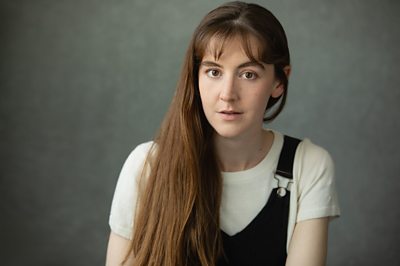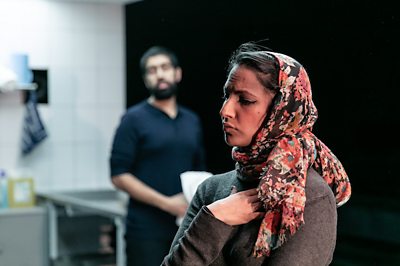Following last week, 's Executive Director, Chris Foxon, explains the costs, reasons and rewards behind running a new playwriting competition, in an increasingly tough financial environment.
This blog post is part of our WRITING TODAY series where we invite guests to blog about the issues that are affecting the industry from their point of view.
The views expressed in the blog post are the views of its author and should not be taken as representing the views of the ����ý.
For the last twelve years I’ve co-run , a theatre company (and registered charity) devoted to opening pathways into playwriting, especially for people who might otherwise have no access to theatre. My entire working life has coincided with austerity, seemingly bouncing from recession to recession, cutbacks piled on cutbacks, so it’s never been easy – but in the last couple of years, the challenges facing the arts, and the new writing sector especially, have exploded. Ironically – or, perhaps, consequently – our greatest successes have come in this period, notching up Olivier, Critics’ Circle, OffWestEnd and South Bank Sky Arts awards as well as a place in of industry leaders. That’s pretty good for a small company with no core funding, making world premieres with little known, often debut, writers. We veer from frowning anxiously over spreadsheets to smiling awkwardly at award ceremonies – but most people only see the successes, not the struggle.
That prompted me to share of what it takes to run an open call-out for new writing, and what the pressures and risks are. Despite these, we believe giving voice to new writers is more important in hard times than ever. But if we don’t understand the existential challenge facing such opportunities, we risk losing them. So here it is, an insight into Papatango, warts and all…

We’re currently opening a world premiere production, Some Demon by Laura Waldren, which will run at (London) and . This is part of the , a competition for new plays which Laura won from 1468 entries. This forms a case study for the costs entailed of identifying new writers, developing and commissioning them, then producing them in meaningful, career-defining productions. The figures cited below reflect this specific process, but are roughly in line with industry standards.
There’s a lot of debate at the moment around the best ways of developing new writing, and especially what support is available (or not) for playwrights. We run lots of opportunities, from creative learning to CPD (continuing professional development) to commissioning and productions. But the Papatango Prize is probably the best known. There are good and bad sides to competitions. We try to make ours worthwhile with:
- feedback for anyone who asks (98% of entrants do), to invest at least a bit in each writer rather than just a (lucky) few;
- showcases & cash for shortlisted writers;
- production, publication, commission and royalties for the winner.
We try to read each script with rigour and care. We have three reading rounds, plus safety nets (second opinions from senior readers; comparing notes from different readers; a diverse team). Of course it’s subjective. That’s not unique to competitions – any script reading process is – but it can feel more intense or exposing. But I’ll argue later why this isn’t really the case.
Our readers are chosen carefully (only 40% make it through a rigorous assessment to become a reader). They represent diverse experiences. Across our history, readers are: 31% male (cis & trans), 64% female (cis & trans), 5% non-binary; 27% from the global majority; 35% LGBTQIA+; 84% state-educated; 68% based regionally; 16% disabled.
Could the Prize process be better? Yes. But not without impossible costs. This year’s Prize, which is currently entering its final round of reading, had a record 1589 scripts. We go annually, whereas most other similar schemes only have capacity to run every other year, given the huge workload involved. So in any two-year period, we read 3,000 – 3,200 scripts. Others like the or Award get around 2500 – 3000. As we only take entries from the UK/Ireland, not globally, we probably support more domestic, homegrown writers than anyone else.

That costs Serious Money (). Our reading team fees this year come to £28,300. Our script portal makes anonymised assessment, distribution over three rounds and individual feedback emails possible. This is custom built, so cheaper than commercial offerings, but still costs us £1,500 a year in software subscriptions. So, without including staff or overheads, just reading all the Prize scripts with care and attention costs approximately £30,000. If you do factor in staff time and overheads like IT, training, governance etc, it’s more like £45,000. Just to process entries, read, liaise with entrants regularly so they know what’s happening, and eventually deliver all those individual, personal feedback emails: £45,000.
For that money, we could commission four plays from four writers. We could choose writers who are known to audiences and press, we could request scripts of a certain scale and size (or celebrity vehicles), we could minimise our risks and expand our returns. Instead, we pump money into an open call-out. Let no one say a competition – at least, if it’s run carefully and thoroughly – is a cheap way to find plays! It’s expensive and high risk. What if there isn’t a good choice? What if the best options have huge casts? What if a venue doesn’t like your choice and pulls out?
So why do it? Because open, accessible call-outs are ever more important.

But why make it a competition? Because that’s a useful lever to fundraise (and cover all those huge costs). Trying to pitch a general script assessment process is much less appealing to funders. Because it helps attract press, which is increasingly hard for new plays by unknown writers but which can make a career. Trying to get reviews and features is harder than ever. A competition framework helps. And, most importantly, because a competition has to commit to something. A cast-iron guarantee of some kind of support, something writers can rely on, unlike general call-outs when they have to compete with revivals or commissions or, you know, big Will Shakespeare… A competition has to support writers.
The costs only begin here. Once a script is picked, it goes through development. People often assume that to win a competition from hundreds or thousands of scripts, a play must be perfect. Of course not. Part of the joy of reading is to look for potential. Many of the best writers are still developing, or wrote a script in a rush for the deadline, or don’t have the time or resources or privilege to redraft and tweak and polish. Our job is to support those people, and give them the pathway to a career they might not otherwise have. We have a duty of care to that writer and have to make sure their script is as strong as it can be.
Winning plays therefore go through at least a year of development. The process changes with the needs of each writer, but usually includes several redrafts and at least one workshop with a cast to test it. That costs £2,500 - £3,000 in fees and space. Staff time for dramaturgy is approximately £8,000.

Of course, we have to pay those writers for their time and stories. The winning and shortlisted writers this year receive a total of £11,000 in commissions or cash awards. The winner also gets 8% of the box office from their eventual production in royalties – which varies a lot, depending on venue and sales, but is usually around £3,000 - £5,000.
So, taking all of that into account, even before we get to the stage, the process of reading, commissioning and development has cost around £70,000. That’s what it takes to try to make sure all writers get at least some support and that the winner is prepared for a lot of scrutiny.
Now, onto the production. It varies hugely with each play in terms of cast size, creative vision and needs, and what our venue partner(s) can offer. This year, Some Demon is a cast of six. It’s a big, ambitious play – that’s what we love about it. Laura has a story to tell! A cast of six isn’t mind-blowing, but it’s still pretty big and expensive compared to most new plays being made (unless they’re by ). We choose plays we believe in, not plays that are cheap. Our job is to take the risks others won’t on a new script by an unknown writer.
We’ll be sharing the show outside London, as we did on national tours before the pandemic temporarily halted our touring. So Some Demon will play at Arcola and then Bristol Old Vic. As we rebuild, we’d love to tour more extensively in the future – though that haemorrhages money. We always look to work around a full, month-long London run as it’s where press and industry are concentrated. Getting the reviews and connections to launch a writer’s career is easier here. It shouldn’t be, but it is. We owe it to our writers to give them access to those opportunities, not parrot a false narrative.

To make a play with this size of cast in a full London run then go to Bristol demands a budget of £110,000. As we direct and produce in-house we save a lot; if we hired freelancers for roles the budget would swell towards £125,000. Our venues for Some Demon have been amazing and support us with a split. If we had to hire spaces, as we often do, that would cost an extra £30,000 - £45,000.
So, even excluding those director/producer fees and venue hire charges, our total budget for the Prize process and to produce Some Demon is £180,000. It would be more like £240,000 if we were hiring a venue and external director/producer. But it’s still a fortune.
To put this in context: we expect our share of the split box office to be around £17,000 - £27,000 in total across London and Bristol, after VAT and commissions but before royalties. If we sell really well, it might be more. But not much more. Taking a middle of that range, £22,000, we’re left with a shortfall of £158,000. And that’s with venue support.
Please remember: we have no core funding. We’ve no private donors. We were founded and are still led by a team from lower socio-economic, regional backgrounds, so there’s nothing to fall back on. We’re lucky that over many years we’ve worked hard to build up a strong fundraising network with trusts and foundations. But each bid is project-specific. Every year there’s no guarantee. We’ve managed to raise the funds this time. Next year? The year after? Who knows?

We haven’t had funds for the Prize since 2021. They funded us for a decade and played a huge part in our growth. We will always be grateful. But then they stopped. That’s a major gap we are still trying to fill. It seems our focus on launching careers and reflecting the London concentration of industry and press isn’t a fit for the current strategy. Perhaps a competition is also out of kilter and seems too elitist – though, for the reasons above, we believe it’s a mechanism which makes support for writers more viable, not less.
This means we’re more exposed than ever. And audience numbers for new work by unknown writers have plummeted since the pandemic and financial crisis. Who can afford to chance £20 or £30 (which is what most venues need to charge now, because the bottom line is so terrifying, unless they’ve got the funding) on a new play which may or may not be any good?
The cuts to public subsidy, increased competition for funding from sources other than the Arts Council, and much diminished box office returns come alongside spiralling costs for production. It’s a deadly double squeeze.
That might sound depressing (well, it is). Why try to work in these conditions? Why plough on with something so obviously risky, rather than pivot to smaller-scale (cheaper) productions, or more commercially viable commissions, or just reviving a known hit?
Because stories that reflect how we live now, that articulate what it means to confront today, matter. They bring together our shared experiences, they speak for now and they speak to the future, they immortalise the people and places who might otherwise go overlooked. They have a value that exists outside the numbers above.
But back to cold, hard facts. To run something like the Prize isn’t a cheap cop-out. It’s a high risk process. We do it because we want to find new writers, not commission safe choices. It’s far from perfect, and if we had the resources we could do even more, but we think it matters.
Many in the sector face the same challenges as we do. Something has to change, and soon, or these kinds of opportunities for the new, the risky, the different will simply vanish. It’s for all of us to speak up for the stories and the culture we want to see, while we still have them.
Explore other free to enter writing opportunities on our website

